Japan's 'living artwork' invents new fashion style
- Published
Living art: Meet Harajuku's ethereal fashion icon
An artist has garnered a cult online following internationally after inventing a quirky Japanese street fashion style eight years ago.
Minori combined Shironuri (which means "painted white") powdery make-up with vintage clothing to form a new style.
By using her body as a canvas, Minori is essentially a "living artwork", and her art is primarily depicted in photos.
Her creative expression has inspired other young women to adopt the trend.
Lady in white
Minori, 26, lives in Tokyo. The white make-up offers her anonymity, and only her friends and family know her real identity, which means that when she is not dressed up, she can live a private life away from prying eyes.
In her teens, Minori was just one of the many young women who frequented Harajuku, a district in Shibuya, Tokyo where people go to see and be seen in quirky, unusual and often outrageous fashion styles.
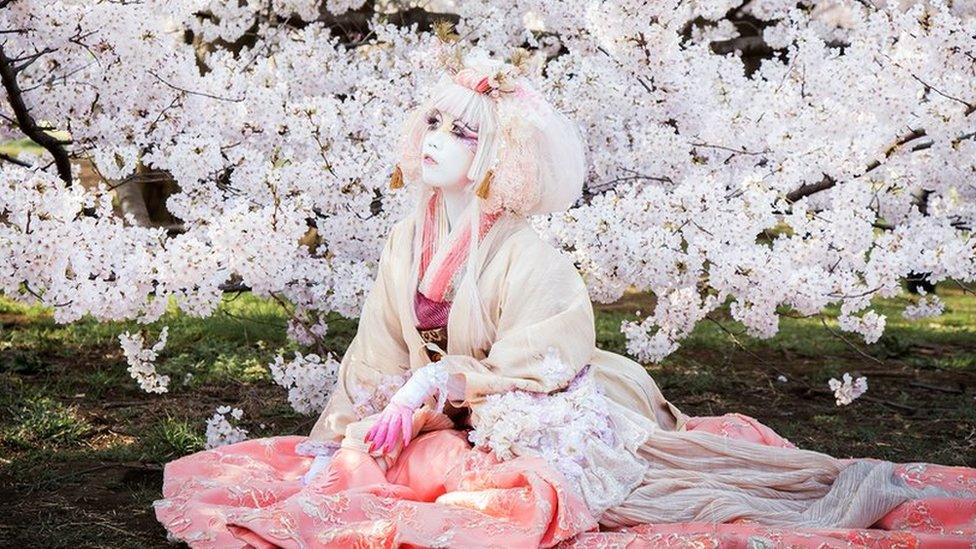
Minori says she is inspired by nature and the blank canvas white make-up offers
She used to enjoy wearing Elegant Gothic Lolita fashion, but over time she didn't feel that the style suited her.
"I always felt a sense of discomfort that my skin colour and make-up did not match my clothes," she tells the BBC.
"Once I painted my face white, I could make my face from my imagination, and that felt wonderful. 'This is it!' I thought."
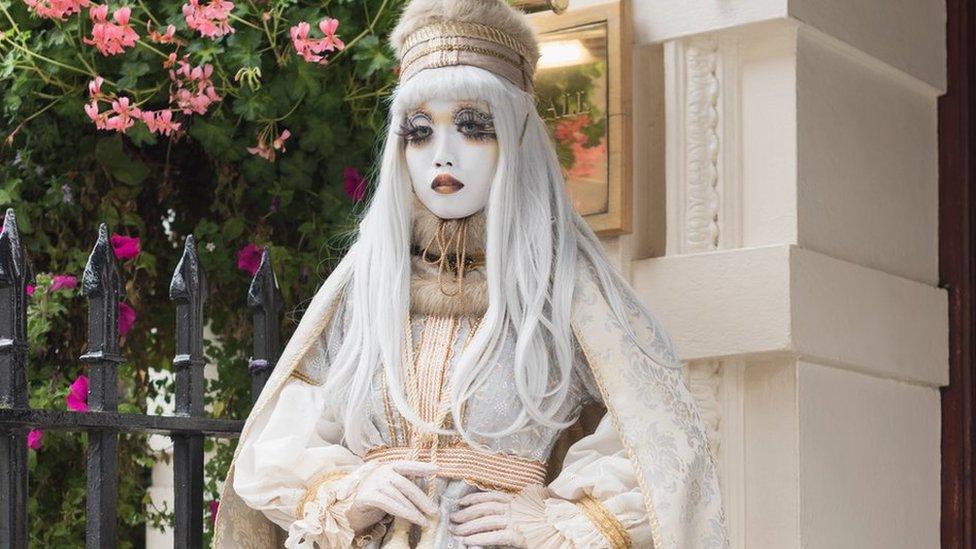
Minori designs and creates all her outfits from scratch
In Japan, there is a long tradition of using white make-up that dates back to medieval times.
From the 9th to 11th Centuries, a time known as the Heian period, men from aristocrat families painted their faces as a mark of their status.
The trend was later adopted by women in the 17th century, when geisha, external - high class female entertainers - began to appear.
Then, during the Showa era - from 1926 to 1989 - the word "Shironuri" was first coined.
Inspired by the ultra-nationalism at the time, people wore male and female Japanese school uniform styles gakuran and sailor fuku, carried Japanese war flags, and painted their faces painted white using geisha make-up.
Inspirations
Instead of a political expression or entertainment tool, Minori has evolved Shironuri into an art form, applying unusual false eyelashes and intricate make-up that matches the themes of her outfits.
She grew up in the Japanese countryside, and considers nature to be one of the main inspirations for her art.
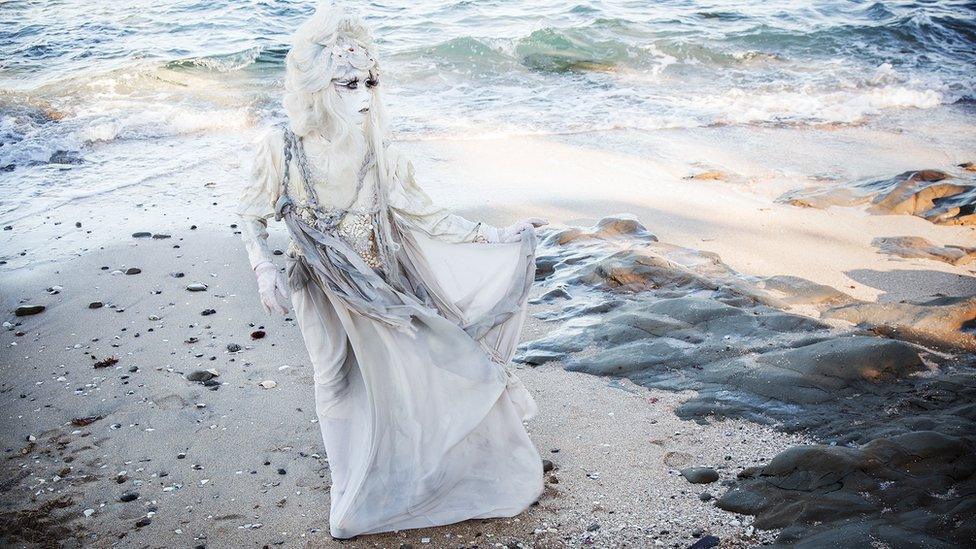
Minori emulating the sea and the sand
"The pattern of fallen leaves and tree branches, the shape of flowers - I thought that it would be beautiful if I combined white paint with such motifs in make-up," she says.
"At the time, only geisha make-up was mainstream, but I thought that it was boring. I really wanted to create something that no one had seen before, had never done before."
Over the last three years, Minori has started to appear at Japanese fashion events in other parts of the world, invited by fans who learned about her work from fashion blogs., external
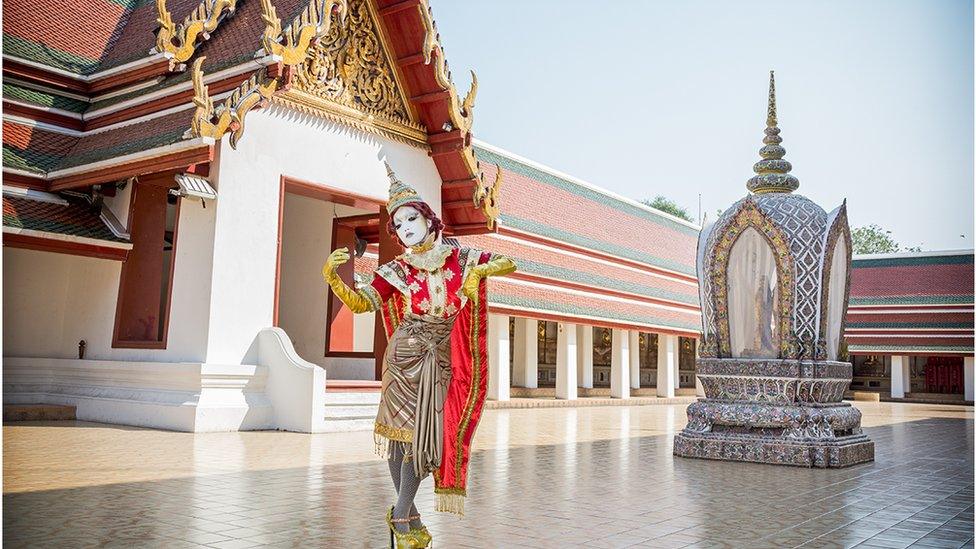
Minori has been invited to various countries, including Thailand, to showcase her art
She was also asked to appear in the ITV documentary series Joanna Lumley's Japan, external, and in the Japan episode of Chelsea Handler's Netflix series Chelsea, external.
However, she says that she is probably least popular in Japan, where views on what young women should be wearing are still quite conservative, despite the diversity of fashions seen in the capital.
"Many Japanese people think I am a strange being, but overall the response is more positive than before," she says.
Her family is very proud of her and her mother sells photo books featuring her many different outfits to friends.
Living artwork
Minori is not alone in her career as a living artwork - in the UK, artist, fashion designer and stylist Daniel Lismore, 32, has been doing something similar for the last 15 years. He has more than 6,000 items of clothing and accessories.
Minori says she wants to represent a sort of "living energy", while Mr Lismore seeks to trigger reactions from viewers.
But despite the differences in their work, both artists are no strangers to adversity.
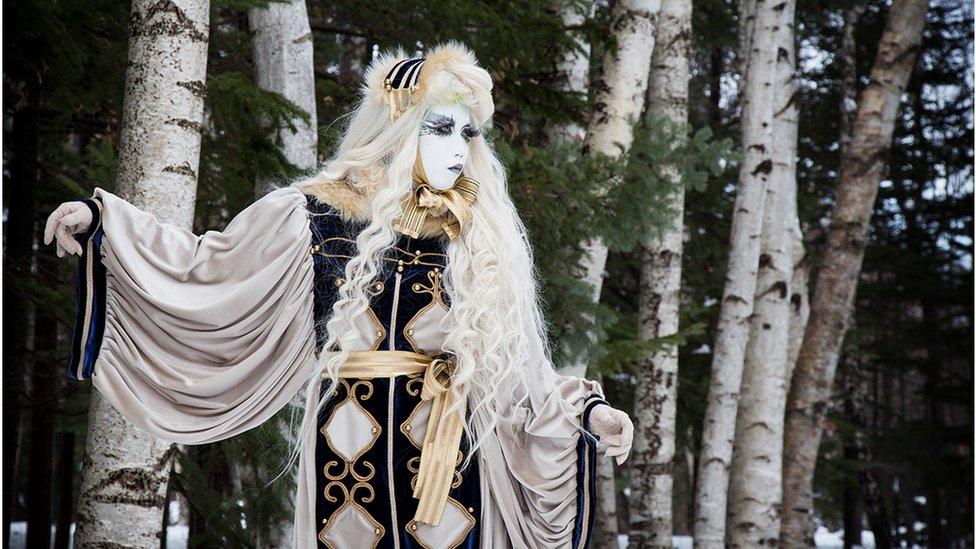
Minori enjoys being photographed surrounded by nature
"I've been spat on, beaten up, hurt and abused on the street, and then I've been put on private jets, flown around the world and invited to royal palaces, and my work's been put in museums around the world," he tells the BBC.
"It's a really interesting way to live - it's fun and it's creative, it opens up doors to me that probably wouldn't be open to me any other way, and closes doors as well.
"It's a chance for me to show my art. It's walking street art in way."
However, Mr Lismore has learned to become comfortable in his own skin, and during a recent meeting with Minori at the Frieze Art Fair in London, he urged her to continue with her art, no matter how other people react to it.
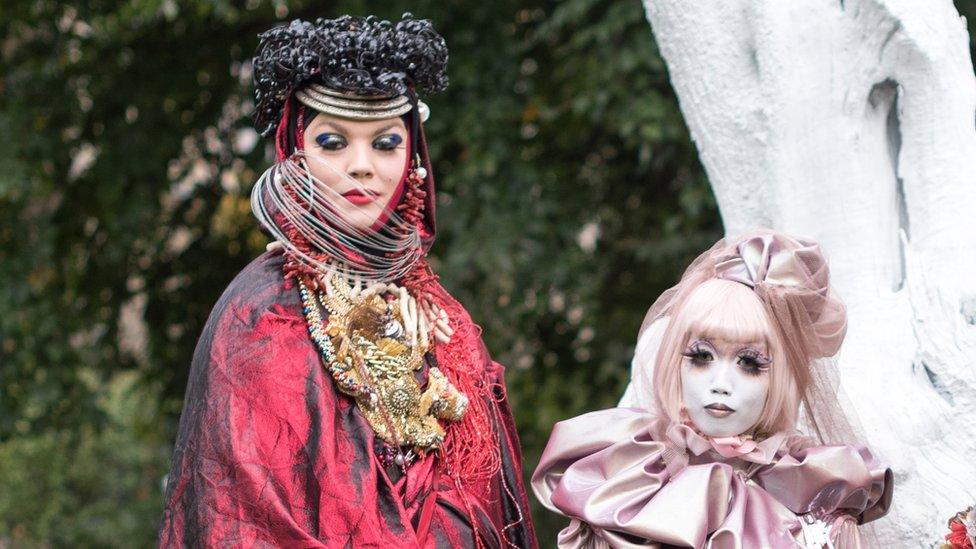
British "living artwork" artist Daniel Lismore meets Minori
"You get all sorts of reactions, some very positive and some very negative," said Mr Lismore, who is an ambassador for Tate's Circuit Programme,, external which helps young people gain access to museums across the UK.
"There's a lot of fear in people. It's fear of the unknown, and fear via lack of culture.
"A lot of people won't like what you do and won't be able to understand it, but the right people will love you for who you are and what you do.
"Everyone else is irrelevant."

Follow us on Facebook, external, on Twitter @BBCNewsEnts, external, or on Instagram at bbcnewsents, external. If you have a story suggestion email entertainment.news@bbc.co.uk, external.
- Published22 September 2017

- Published18 October 2017
